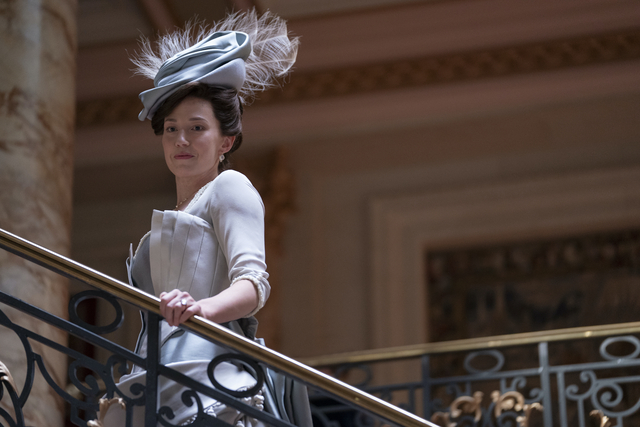Save for a 2019 revival movie (and its upcoming sequel later this year), the absence of Julian Fellowes’ aristocratic costume drama “Downton Abbey” has left an ornately-manicured hole in the pop culture atmosphere. Yes, we’ve filled it with “Bridgerton” and “The Great,” but those shows play giddily with anachronisms of race and language and lust. Fellowes doesn’t need all that postmodern frippery; his interest is squarely in where the old meets the new, where traditions clash with modernity, and how technology and social advancements shrink the worlds of those for whom life as it was served them quite nicely. This time, with “The Gilded Age,” he abandons jolly old England for the American frontier, and the results are as dazzling as they are dangerously familiar.
The Gilded Age itself, of course, refers to the boom years of the late 19th-century when the Industrial Revolution changed the landscape of American wealth. This was when the Rockefellers, the Carnegies, and the J.P. Morgans of the world came to prominence, railroad men and robber barons taking advantage of cheap labor and mechanization to build fortunes to rival the bluebloods whose own wealth stretched back centuries. Now, the nouveau riche had the literal and social capital to enter the upper crust, and the old-money aristocrats bristled at the idea of their lessers standing on their level.
That’s the dynamic at the heart of Fellowes’ newest series, which ports all the lush period costuming and sizzling class tensions across the Atlantic with nary a feather ruffled. We’re no longer staring at one isolated manor in a field, but two houses facing each other on a bustling New York roadway in 1882. One belongs to the van Rhijns, a family of generational wealth led by the widowed and wizened Agnes van Rhijn (Christine Baranski, who hurls an acidic bon mot as swiftly as Maggie Smith’s Dowager Countess) who lives there with her kinder, but less fortunate sister Ada (Cynthia Nixon).

The other? A newly-constructed mansion with high ceilings and even higher aspirations, the product of railroad tycoon George Russell (Morgan Spector) and his social-climber wife Bertha (Carrie Coon). While George is busy building his empire (and bribing aldermen and undercutting competitors to do it), Bertha doggedly pursues the social acceptance of her new peers. “I don’t want my old friends,” she tells Morgan. “I want new ones.” But making those friends, especially in a stubborn matriarch like Agnes, will prove to be trouble.

Further complicating this dynamic is the arrival of Agnes and Ada’s niece Marian Brook (Louisa Jacobson, daughter of Meryl Streep), who comes from rural Pennsylvania to live with them after her father dies, leaving her penniless. On the train, circumstance bonds her to a young Black woman named Peggy Scott (Denée Benton), an aspiring writer coming to live with family in Brooklyn to make her start. Soon, Marian is torn between several different worlds—old and new money, white and Black, male and female—as the social war for America’s new class dynamics rages on.
In all the right ways, “The Gilded Age” feels like “Downton Abbey,” from its well-manicured production design to its stunning costumes, to the far-reaching cast of characters. It’s got an American sensibility, to be sure; after all, most of the cast is drawn from New York’s mantle-deep pool of theater actors. (It even makes room for Nathan Lane as famous New York socialite Ward McAllister, whose Savannah drawl has big Caleb Crawdad energy.) But it’s still a tale of feuding elites, intricately-organized salons, and the wide rifts between upstairs and downstairs at its core. Take a drink every time someone says “luncheon”: four episodes in, the only thing gilded will be your liver.
“Downton Abbey” veteran Michael Engler, along with Salli Richardson-Whitfield, direct with an eye for elevating these characters’ squabbles to the level of high drama, with ornately-staged, long shots floating through the Russell’s new home like it’s the Copacabana. So much the better, too, to capture all the glistening chandeliers and foot-tall fascinators these people use as signifiers of wealth. While the servants don’t get as much real estate as they did in “Downton Abbey,” the Russells’ phalanx of help—from a pompous French chef (Douglas Sills) to a ambitious maid (Kelley Curran) who spends every scene enigmatically plotting her escape from servitude—offer the occasional contrast between the classes.
But “The Gilded Age” is mostly interested in exploring Marian’s status as a window into both worlds, which isn’t nearly as exciting as one would hope. Jacobson injects a welcome naïveté to the role, to be sure, and her dynamic with Peggy is refreshingly aware of the unspoken racial rifts between them. (In one episode, she pays a surprise visit to Peggy’s house in the largely-Black borough of Brooklyn to donate some old shoes, only to learn that her presumption that Peggy’s family was poor was misplaced.) Benton, for her part, shines when she’s allowed to take center stage outside of a white gaze; her scenes with her rich parents (including the always-luminous Audra MacDonald) and a Black newspaperman interested in her stories are some of the show’s most intriguing. For an America in the process of elevating itself to prosperity, these are the moments that come close to acknowledging that privilege isn’t afforded to some.

But for its impeccable cast and presentation, “The Gilded Age” occasionally bites off more than it can chew. Individual scenes shine, but the pacing is rather inconsistent, and major subplots seem to come and go in the background with little fanfare. A couple of episodes in, George’s underhanded machinations result in calamity for an alderman whose bill he needed to tank; apart from some strong words from his wife to Bertha, it hardly factors into the overall story. Many of the younger characters drift along in the background, from the Russell’s demure daughter (Taissa Farmiga) to Agnes’ dandy son Oscar (Blake Ritson), whose clandestine gay love affair is the spiciest the series truly gets. There’s even an erstwhile Romeo and Juliet story as Marian starts spending time with the Russells’ collegiate son Larry (Harry Richardson), but he hardly registers as a character.
Still, a lot of narrative chickens have yet to roost, and there are enough ephemeral delights in “The Gilded Age” to make it worth an initial gander. Baranski still purrs bone-dry witticisms with the best of them (“You’ll be thrilled!” Nixon chirps at her; her withering response? “I haven’t been thrilled since 1865.”). Coon’s icy gaze portends social calculations too devious to contemplate. Plus, there’s a Cocker Spaniel named Pumpkin, so it can’t be all bad.
For better or worse, “The Gilded Age” carries all of the strengths and weaknesses of “Downton Abbey” to a Yankee milieu. It’s gorgeous and beautifully staged, with all the comforting pageantry that its period setting allows. And Fellowes seems more game to openly critiquing America’s class and race divides than he was in his sun-dappled nostalgia for King George’s England. But can you really be that critical of the forces that built such ostentatious wealth when showcasing that wealth is part of the appeal? Time will tell whether Fellowes’ trans-Atlantic experiment will work, or if this kind of Merchant-Ivory formula has finally run its course.
The Gilded Age premieres on HBO January 24th. The first five episodes were screened for review.












